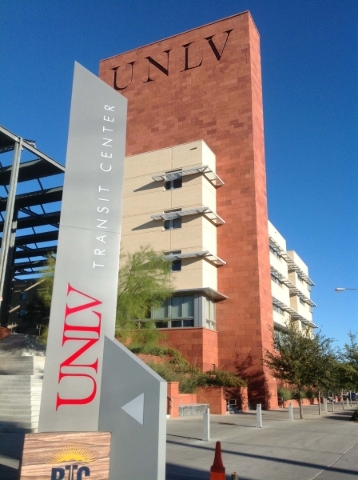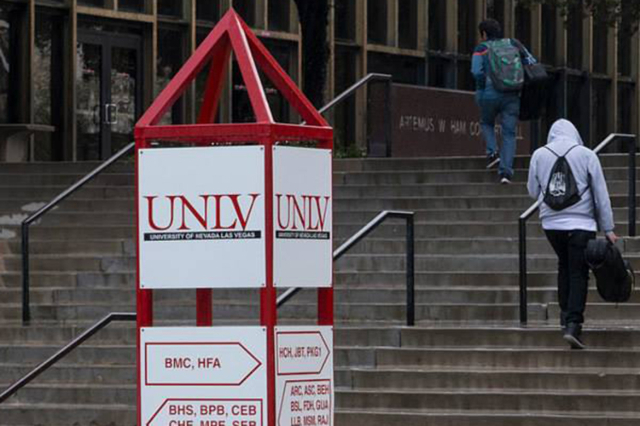UNLV faces uphill battle in quest for prestige
The University of Nevada, Las Vegas has long wanted to join the nation's higher education big leagues.
"There's been a collective aspiration both on campus and off this university to get to the next level," President Len Jessup said last week while announcing the school's launch of a high-profile research partnership with Tesla Motors. "It's definitely a new day."
Over two decades, a string of five presidents has set lofty goals to boost UNLV's reputation as a research institution with hopes of bringing in more competitive students, more experienced faculty and more funding. And although UNLV faces many obstacles in reaching those aspirations, administrators believe promising signs have emerged that the university is on its way to becoming one of the country's most highly regarded higher education institutions.
Last week's Tesla announcement, for instance, was touted as a way to help elevate UNLV's name as it tries to grow its research potential. The university also announced in late September that it was picked to host the final presidential debate before next year's general election, an event that will thrust UNLV into the national spotlight and probably yield a bevy of positive publicity.
"UNLV has come a long way in its 50-plus years," Senior Vice Provost Carl Reiber said. "We want to be better in all aspects of what we do."
Rising reputation
UNLV's national reputation has risen significantly in the past 20 years thanks largely to its performance in college rankings.
Its first notable boost came in the mid-1990s when it became a nationally recognized research institution by the Stanford-based Carnegie Foundation for the Advancement of Teaching. Carnegie placed UNLV in its second-best tier of research institutions, joining the likes of George Mason University and Northern Arizona University. It has since remained in that tier.
At the time, UNLV was labeled a midlevel regional university in another set of rankings by U.S. News & World Report, joining the publication's category of smaller Western schools with limited curriculum. But thanks to steady growth in enrollment and program offerings, the university has since shaken that label to join the publication's "national universities" category, which includes more high-profile institutions that offer a full range of undergraduate, master's and doctoral programs.
UNLV has even done slightly better than its sister institution in one U.S. News category that uses input from high school counselors to determine which colleges offer the best undergraduate education. UNLV scored 3.2 out of 5 this year, while the University of Nevada, Reno scored 3.1. Overall, U.S. News ranks UNR as 187th among national universities. UNLV, meanwhile, is unranked in the same category.
"UNLV has always had a bit of a complex about not being taken seriously," said Dewayne Matthews, vice president of strategy development of the Lumina Foundation, an Indianapolis-based philanthropy focused on higher education issues. "I'm sympathetic to the fact that they think some kind of external validation is the route to prestige."
Quest for prestige
The school's pursuit for name recognition began under the leadership of former President Carol Harter, who served from 1995 to 2006 and oversaw the school's initial rise in Carnegie research rankings. UNLV has since sought to climb up the list, hoping to join other top-100 tier schools such as Arizona State University and the California Institute of Technology.
The plan for achieving a higher ranking has morphed through the years under four subsequent presidents, but desired outcomes haven't changed. Administrators believe that a better reputation can help UNLV raise more money, a goal that has become increasingly important for a university that was devastated by the recent economic downturn.
UNLV leaders and state policymakers hope that the university will produce a more competitive and diverse workforce for Southern Nevada, whose economy depends almost entirely on tourism. Gov. Brian Sandoval — intent on attracting more high-tech jobs to the state — has vowed to transform Nevada's struggling education system, and UNLV's future could play a key role in those efforts.
"People are going to look at our state as a cradle of research," Gov. Brian Sandoval declared at last week's Tesla announcement. "This does represent this new Nevada."
Uphill battle
But UNLV faces an uphill battle in becoming a more highly ranked research institution — its staffing and budget are significantly below that of the schools whose ranks it wants to join.
UNLV needs to spend about $80 million more per year on research, award about 100 more doctoral degrees per year and hire about 100 more postdoctoral scholars if it wants the loftier designation. But the relatively new university is still reeling from budget cuts wrought by the Great Recession, and it's a commuter school that doesn't attract much in donations from its alumni base.
The school last year drew about $75 million in private support during the last fiscal year, while ASU — a model institution for UNLV — drew more than twice as much during the same period. Still, an aggressive fundraising campaign launched by UNLV's first-year president has yielded some sizable pledges, including a $10 million gift from the Engelstad Family Foundation to help pay for the university's budding medical school.
UNLV is also a minority-serving institution that caters to many low-income, first-generation college students, and experts warn that its push for prestige could counter efforts to make college attainable for the region's underserved communities. While favorable college ratings are welcome news for the university, their value is often undermined by scholars who warn that their supporting methodology is arbitrary and oversimplifies the value of higher education.
"(Universities should) quit playing ranking games and focus more on community needs," Matthews said. "They need to build those relationships so that the people that they're serving think they're great, not some journalist back in Washington, D.C."
Contact Ana Ley at aley@reviewjournal.com or 702-224-5512. Find her on Twitter: @la__ley


















